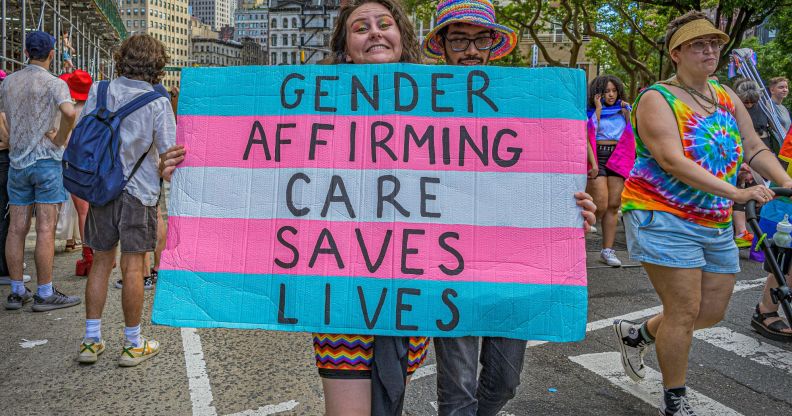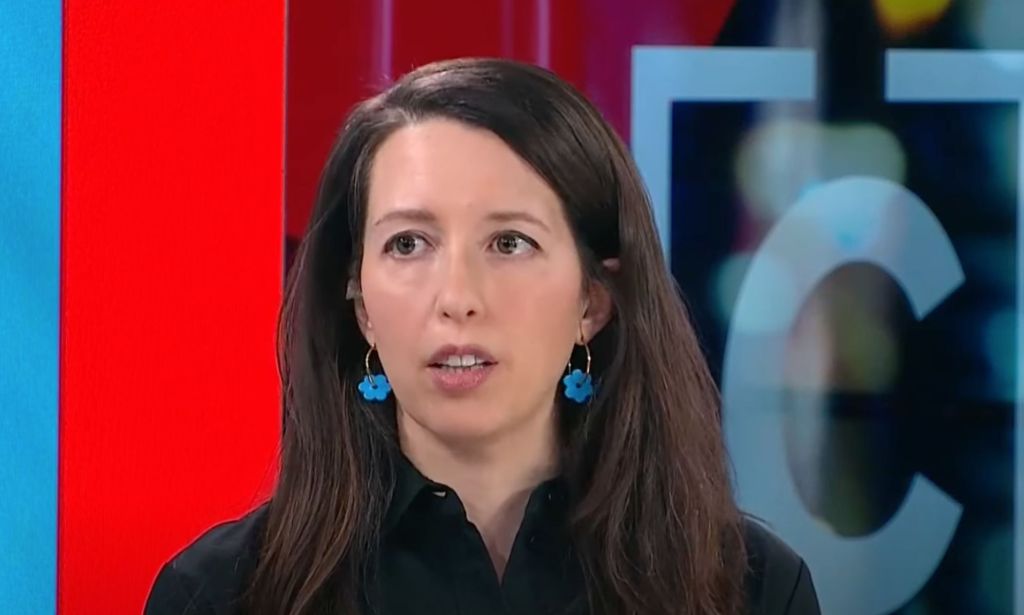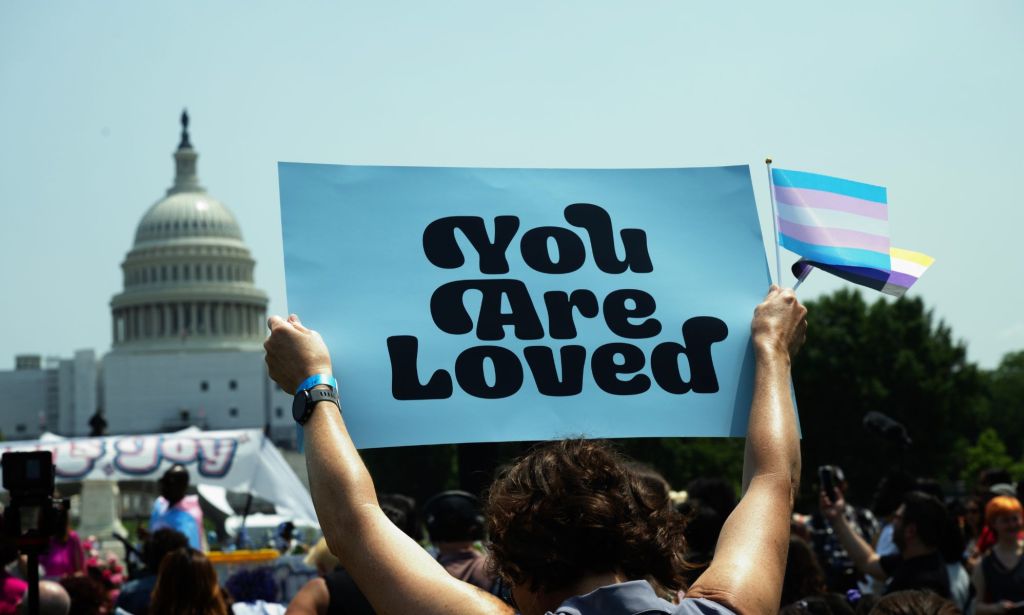Medical expert explains how trans healthcare bans hurt us all: ‘Nobody seems interested in reality’

A medical study has likened gender-affirming care bans for minors to ‘abuse’. (Getty)
As Louisiana becomes the latest state to ban healthcare for trans youth, a gender-affirming care specialist explains how attacks on this “life-saving” treatment can hurt everyone.
The Republican-dominated Louisiana legislature overrode a veto from governor John Bel Edwards on Tuesday (18 July), instigating a ban on gender-affirming healthcare for all trans youth in the state.
Under the legislation, which is set to go into effect at the start of next year, trans youth currently receiving gender-affirming care will be taken off the course of treatment by the end of 2024, forcibly detransitioning them.
Louisiana joins 19 other states that restrict how trans people, particularly those who are young, can access healthcare. Some states – including Alabama and North Dakota – consider it a felony to provide gender-affirming care to trans youth.
The Louisiana bill’s lead sponsor, representative Gabe Firment, described gender-affirming healthcare as “life-altering irreversible medical experiments”.
But Dr Meredithe McNamara, an expert in gender-affirming healthcare and adolescent medicine at the prestigious Yale School of Medicine, says such claims ignore the “reality” that trans healthcare has a long history in the US and beyond.
She believes that few, if any, of those seeking to restrict such care “have ever been to a gender clinic and talked with people”.
Speaking to PinkNews, she says: “I haven’t seen anything along those lines. If you came in and saw how long these conversations are with young people, with their parents, how much we talk about everything, every bit of disinformation would be dispelled.
“But the problem is nobody really seems interested in reality, and that’s the thing that I struggle with because I know that’s true. These politicians know that it’s true, but the truth doesn’t matter.”

Gender-affirming healthcare is the ‘only evidence-based treatment for gender dysphoria’
Opponents of trans healthcare often claim that it is an untested area of care.
When signing Utah’s gender-affirming healthcare ban into law in January, Republican governor Spencer Cox said “more and better research” was needed into the “long-term consequences”.
However, last month, Dr McNamara testified before the US House’s Energy and Commerce Committee, in Washington DC, saying that gender-affirming healthcare is the “only evidence-based treatment for gender dysphoria”.
She explained that this “life-saving care” can include anything from social transition to counselling and medical interventions, such as puberty blockers and hormone therapy.
Dr McNamara stresses that gender-affirming treatments are “far better tested than most things” physicians “provide in paediatrics”.
Any claims that gender-affirming healthcare is “new and untested”, or that society doesn’t “understand long-term outcomes”, suggests to Dr McNamara that Republicans haven’t talked to medical professionals about it.
“That suggests that he [Cox] never had a conversation with a group of physicians who provide this care, who devised the clinical practice guidelines and had honest, reality grounded counselling sessions with real scientists,” she says.
“I would like us to all move forward as a society where expertise guides health policy.”
Trans healthcare bans are part of a broader legislative attack, backed by religious groups and right-wing organisations, on the rights of LGBTQ+ people in the US.
As well as nullifying governor Edwards’ veto on the healthcare ban, Louisiana lawmakers attempted to force through two other anti-LGBTQ+ bills that he blocked: a Don’t Say Gay type bill and a measure allowing public school teachers to misgender and deadname trans students. Both attempts were unsuccessful.
Dr McNamara fears that the “state is traumatising a generation of young people with [trans healthcare] policies”, and that this trauma is “not going to ever go away”.
That’s totally avoidable and doesn’t need to happen, she says.
“If the state wants to have honest, constructive conversations about gender-affirming care, we could do that. We could engage with ways to improve this field further,” she says.
“I’m not saying this is an exclusive problem to gender-affirming care. Every field needs to get better. We’re still diagnosing cancer and sickle cell anaemia, but they’ve just taken the hardline of X, Y and Z equals ban care.
“That’s so disingenuous. It’s so detached from anything that has to do with the well-being of trans youth. It is toxic and dangerous to live with the constant fear that the other shoe is about to drop, that the rug is going to be ripped out from under you and your family.”
A ‘superpower’ for trans youth
The American Medical Association, the American Academy of Pediatrics, the World Medical Association and many other medical organisations support gender-affirming care for trans adults and young people.
Research indicates gender-affirming healthcare leads to improved mental-health outcomes for trans youth, with those who have access to hormone therapy reporting an increase in positive emotions, life satisfaction and self-confidence.

For Dr McNamara, the “greatest gift in the world” is seeing trans young people “thrive” when they’re able to access help.
“It’s the type of thing that physicians crave. It’s why you go into medicine,” she says.
“Trans youth possess the superpower of self-knowledge, which is something that’s really hard for people to get that early in life. For those who know who they are, who are brave and share that with their family members, or maybe their family members have known all along and they get the affirmation they need, it’s just powerful.
“It’s a superpower and we should want everyone to have that in their own way. For some people, it takes a really long time to get there – for trans people, for cisgender people, for gender queer people…
“My hope would be that people realise that we are all healthier as a society when trans youth thrive. Their peers, their cisgender peers, grow and thrive because their trans friends thrive.”
How did this story make you feel?

